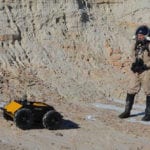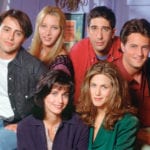 Movies and TV
Movies and TV  Movies and TV
Movies and TV  History
History 10 Momentous Events That Also Occurred on July 4th
 Animals
Animals 10 Times Desperate Animals Asked People for Help… and Got It
 Movies and TV
Movies and TV 10 Movie Flops That Found Their Way to Cult Classic Status
 History
History 10 Things You Never Knew About Presidential First Ladies
 Movies and TV
Movies and TV 10 Zombie Movies That Will Actually Terrify You
 Humans
Humans 10 Times Scientists Were Absolutely Sure… and Absolutely Wrong
 Our World
Our World 10 Pivotal Moments for Life on Earth
 Movies and TV
Movies and TV 10 Most Realistic Medical TV Shows of All Time
 Creepy
Creepy 10 Eerie & Mysterious Ghosts of the Pacific Coast
 Movies and TV
Movies and TV 10 Music Biopics That Actually Got It Right
 History
History 10 Momentous Events That Also Occurred on July 4th
 Animals
Animals 10 Times Desperate Animals Asked People for Help… and Got It
Who's Behind Listverse?

Jamie Frater
Head Editor
Jamie founded Listverse due to an insatiable desire to share fascinating, obscure, and bizarre facts. He has been a guest speaker on numerous national radio and television stations and is a five time published author.
More About Us Movies and TV
Movies and TV 10 Movie Flops That Found Their Way to Cult Classic Status
 History
History 10 Things You Never Knew About Presidential First Ladies
 Movies and TV
Movies and TV 10 Zombie Movies That Will Actually Terrify You
 Humans
Humans 10 Times Scientists Were Absolutely Sure… and Absolutely Wrong
 Our World
Our World 10 Pivotal Moments for Life on Earth
 Movies and TV
Movies and TV 10 Most Realistic Medical TV Shows of All Time
 Creepy
Creepy 10 Eerie & Mysterious Ghosts of the Pacific Coast
10 Books That Accidently Showed Us Our Future
The future is a fascinating place. Especially when looked at as a place our children, nieces, and nephews, and the rising generation gets to inhabit. A gateway into the future is found in the pages of bookshelves. Books talk of the future as a fantasy, a future populated with aliens and interstellar travel. Some even warn of toppled empires and dystopias, providing a sometimes harrowing glimpse into what can happen if the current course isn’t corrected. So, here are ten books that accidentally showed us our future.
Related: Top 10 TV Shows That Predicted the Future and Got It Right
10 An Essay on the Principle of Population
In 1798, Thomas Robert Malthus identified a potential problem in his native England that would soon affect the globe. In his day, infant mortality was falling, and people were living longer lives. This was great news—except for the fact that food production wouldn’t be able to keep up. The reason was simple. Population increases geometrically, roughly doubling every 25 years, but food production could only increase arithmetically. If you wanted more potatoes, you had to plant more potatoes.
The amount of land available was finite, but population growth was potentially unlimited. In the near future, the only way to get enough food would be by taking it from others. What Malthus got wrong, though, was he didn’t foresee the revolution in agricultural techniques. But he did identify a problem we face to this day. The new farming techniques only delayed a crisis many experts see as imminent—too many mouths to feed and not enough to go around. Better yet, not enough hands to work the fields.
9 Parable of the Sower
In Octavia E. Butler’s 1993 novel, she jumps forward to the United States in 2024. The narrator grows up in a gated community that manages to hang on to past means of living and is the envy of the desperate people living around it. General society is trembling as the foundations weaken. Social inequality and corporate greed fracture communal bonds while climate change affects everyone.
Butler built on tendencies she identified in her present and foretold a world we begin seeing today. As we head into another economic downturn, the financial gap between wealthy and poor is widening and begging the question: Is the modern globalized economy accentuating a trend toward a splintering society?
8 Fahrenheit 451
Ray Bradbury’s 1953 novel describes a world where fire crews start fires rather than put them out. (The “451” in the title is the temperature at which paper will auto-ignite.) In the book, the authorities want to build a society that cannot think for itself and becomes easier to control. People will believe what they are told and not ask questions.
Bradbury died in 2012. He lived long enough to see the development of fake news and the so-called “dumbing down” of general culture. The internet had the potential to open the market for ideas to a wider public that was much better informed. Perhaps the opposite has happened, and we are losing the facts in a welter of misinformation.
7 Stand on Zanzibar
Early in the last century, people used to say that the entire world population could stand on the Isle of Wight, a mere 147 square miles. When John Brunner published Stand on Zanzibar in 1968, he estimated that the then-world population of 3.5 billion would need a bigger island. The Isle of Man, 221 square miles, would probably do. Brunner guessed that in 2010 there would be 7 billion of us, and we would need to use Zanzibar, 600 square miles.
His guess about 2010 was almost spot on. Now, the world population is around 8 billion, so we will need a bigger island. Brunner foresaw a world of domination by corporations and computers, genetic engineering, and psychedelic drugs. Did he hit the nail on the head?
6 2001: A Space Odyssey
Author Arthur C. Clarke and movie director Stanley Kubrick worked on the project together. Both the book and the movie came out in 1968, and many informed guesses about the future in 2001 were made. Perhaps the most frightening was the Heuristically Programmed Algorithmic computer or HAL. This AI robot had control over many of the ship’s routine functions and resisted being turned off with fatal consequences. HAL seems intelligent but isn’t. It can only make rational decisions based on the information that it has.
Artificial intelligence is playing an ever-more important role in our daily lives. Many people suspect that even the designers and programmers don’t fully understand what their brainchildren are doing or how they will evolve.
5 Fugue for a Darkening Island
In Christopher Priest’s 1972 novel, he paints a dark picture of a future on the brink of collapse. The country is fighting a civil war that has come about because a new political party has appeared on the scene. The founder of this party won a perfectly legal election but quickly revealed himself to be an authoritarian. At the same time, waves of refugees are arriving on British shores seeking a better way of life—well, any way of life, really.
Tensions build, political discourse becomes impossible, and civil war erupts. At first, the narrator’s only concern is for his family, but he becomes involved in the wider struggle. Fugue for a Darkening Island shows us what can happen when dialogue becomes impossible and populist remedies seem to answer serious problems.
4 Earth
David Brin’s novel Earth came out in 1990 and is an exercise in prediction. He looks at the world 50 years on and tries to guess what will happen. The plot line seems to have come from an older time of science fiction fantasy. We have created an artificial black hole, but it has become lost in the earth’s interior. In a race against time, we have to recover it before it swallows our whole planet. This storyline is really little more than a vehicle for Brin’s guesses about the future.
Most of his predictions had a firm grounding in current events; he foresees a World Wide Web and even predicts that technical progress will inevitably bring about a loss of privacy. Algorithms track our purchases and suggest future purchases, cameras with facial recognition watch us at airports, and our mobile phones tell anyone with the software where we are. Planet Earth is most definitely a spaceship toward the future.
3 The Machine Stops
In 1909, E.M. Forster published a novella called The Machine Stops. The machine is an omnipotent maintenance device that looks after the needs of the large majority of the human population that has chosen to give up life on the surface of their world. It’s easier to live underground. Everyone lives alone in identical rooms and can communicate with each other by videoconferencing.
Some people have rejected this comfortable life and continue living on the planet’s surface. Those who have chosen the subterranean life can no longer survive by themselves. From the title, we can guess what happens. The Machine breaks down, and with it dies the whole system. When Forster wrote his story, it was a complete flight of fancy. After recent experiences, we might think that such a world is not too far off.
2 Looking Backward
In the late nineteenth century, the two bestselling books in the United States were Uncle Tom’s Cabin and Ben-Hur. Edward Bellamy’s Looking Backward closely followed these two classics.
The plot line is familiar from fairy tales. In 1887, Julian West fell into a hypnotic sleep in Boston, Massachusetts; he woke up in the same place but over a century later in 2000. We can highlight two of the changes that West observes. People work fewer hours because it’s not necessary to work a forty-hour week, and everyone can and usually does retire at 45 with a generous pension.
Bellamy’s utopia reflects many socialist ideas of the day. But it is certainly true that, in a modern economy, people don’t need to work as much. We haven’t yet worked out how to distribute wealth fairly or what we might replace work with. After all, for many of us, work is an important part of our identity. We could do it, but should we? When Bellamy’s book came out, clubs emerged around the United States to debate his ideas. Of course, they didn’t resolve the issue, and the debate continues.
1 A Clockwork Orange
Alex is a 15-year-old gang leader in Anthony Burgess’s satirical novel. When the book came out in 1962, the sex and violence in it shocked many readers. Alex’s gang robs and rapes their way through a depressing urban landscape, speaking slang almost incomprehensible to outsiders. But Alex is not just a thug. He is an intelligent kid with a love of classical music. However, he is a young man with no sense of empathy.
Alex is caught by the authorities and subjected to aversion therapy. It works for a while, but he eventually returns to a life of crime. Interestingly, the British version of the book ends on a hopeful note as Alex contemplates giving up his life of crime of his own free will and starting a family. In the United States, the publisher dropped the final chapter, and the American edition has a much darker ending.
The book describes a society that is divided. The gangs seem to operate in an amoral universe inaccessible to the authorities and ordinary people. The popular TV series, The Wire showed us that such a gulf exists and seems to be getting wider.








